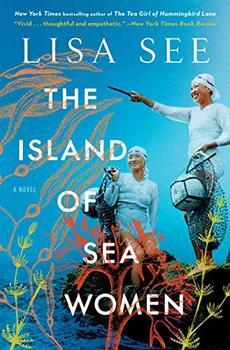Summary | Excerpt | Reading Guide | Reviews | Beyond the Book | Readalikes | Genres & Themes | Author Bio

We had seven bulteoks in Hado—one for each neighborhood's diving collective. Our group had thirty members. Logic would say that the entrance should face the sea, since haenyeo go back and forth from it all day, but having the entrance at the back gave an added barrier against the constant winds blowing in from the water. Above the crash of waves, we could hear women's voices—teasing, laughing, and shouting well-worn gibes back and forth. As we entered, the gathered women turned to see who'd arrived. They all wore padded jackets and trousers.
Mi-ja set down her basket and hurried to the fire.
"No need for you to worry about tending the fire now," Yang Do-saeng called out good-naturedly. She had high cheekbones and sharp elbows. She was the only person I knew who kept her hair in braids at all times. She was a little older than my mother, and they were diving partners and best friends. Do-saeng's husband had given her one son and one daughter, and that was the end. A sadness, to be sure. Nevertheless, our two families were very close, especially since Do-saeng's husband was in Japan doing factory work. These days about a quarter of all Jeju people lived in Japan, because a ferry ticket cost half the price of a single bag of rice here on our island. Do-saeng's husband had been in Hiroshima for so many years that I didn't remember him. My mother helped Do-saeng with ancestor worship, and Do-saeng helped my mother when she had to cook for our family when we performed our rites. "You're no longer an apprentice. You'll be with us today. Are you ready, girl?"
"Yes, Auntie," Mi-ja responded, using the honorific, bowing and backing away.
The other women laughed, causing Mi-ja to blush.
"Stop teasing her," my mother said. "These two have enough to worry about today."
As chief of this collective, Mother sat with her back against the part of the stone wall that had the best protection from the wind. Once she was settled, the other women took spots in strict order, according to each one's level of diving skill. The grandmother-divers—those like my mother, who'd achieved top status in the sea even if they had yet to become grandmothers on dry land—had the best seats. The actual grandmothers, like mine, didn't have a label. They were true grandmothers, who should be treated with respect. Although long retired from sea work, they enjoyed the companionship of the women with whom they'd spent most of their lives. Now Grandmother and her friends liked to sort seaweed that had been washed ashore by the wind or dive close to the beach in the shallows, so they could spend the day trading jokes and sharing miseries. As women of respect and honor, they had the second most important seats in the bulteok. Next came the small-divers, in their twenties and early thirties, who were still perfecting their skills. Mi-ja and I sat with the baby-divers: the two Kang sisters, Gu-ja and Gu-sun, who were two and three years older than we were, and Do-saeng's daughter, Yu-ri, who was already nineteen. The three of them had a couple years' diving experience, while Mi-ja and I were true beginners, but the five of us were ranked the lowest in the collective, which meant that our seats were by the bulteok's opening. The cold wind swirled around us, and Mi-ja and I scooted closer to the fire. It was important to warm up as best we could before entering the sea.
Mother began the meeting by asking, "Does this beach have any food?"
"More food than there are grains of sand on Jeju," Do-saeng trilled, "if we had an abundance of sand instead of rocks."
"More food than on twenty moons," another woman declared, "if there were twenty moons above us."
"More food than in fifty jars at my grandmother's house," a woman who'd been widowed too young joined in, "if she'd had fifty jars."
"Good," Mother said in response to the ritual bantering. "Then let us discuss where we will dive today." At home, her voice always seemed so loud. Here, hers was just one of many loud voices, since the ears of all haenyeo are damaged over time by water pressure. One day I too would have a loud voice.
Excerpted from The Island of Sea Women by Lisa See. Copyright © 2019 by Lisa See. Excerpted by permission of Scribner. All rights reserved. No part of this excerpt may be reproduced or reprinted without permission in writing from the publisher.
Your guide toexceptional books
BookBrowse seeks out and recommends the best in contemporary fiction and nonfiction—books that not only engage and entertain but also deepen our understanding of ourselves and the world around us.